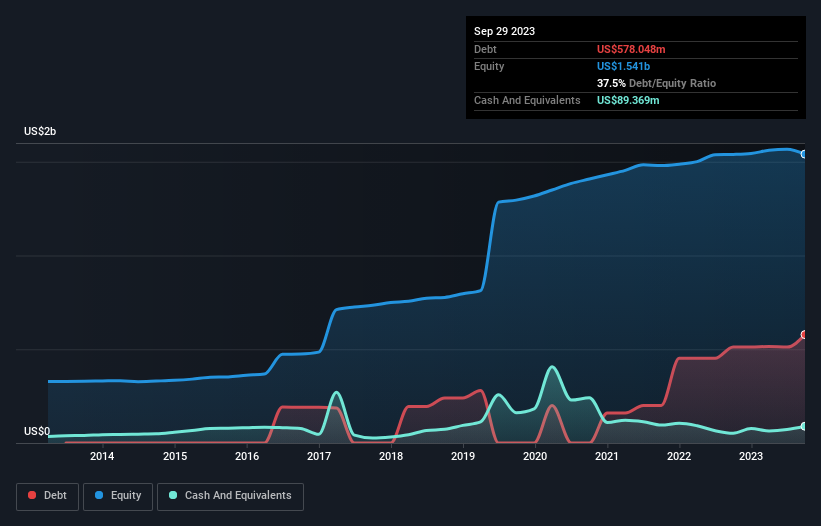- United States
- /
- Aerospace & Defense
- /
- NasdaqGS:MRCY
Would Mercury Systems (NASDAQ:MRCY) Be Better Off With Less Debt?
Legendary fund manager Li Lu (who Charlie Munger backed) once said, 'The biggest investment risk is not the volatility of prices, but whether you will suffer a permanent loss of capital.' When we think about how risky a company is, we always like to look at its use of debt, since debt overload can lead to ruin. Importantly, Mercury Systems, Inc. (NASDAQ:MRCY) does carry debt. But should shareholders be worried about its use of debt?
When Is Debt Dangerous?
Generally speaking, debt only becomes a real problem when a company can't easily pay it off, either by raising capital or with its own cash flow. Ultimately, if the company can't fulfill its legal obligations to repay debt, shareholders could walk away with nothing. However, a more usual (but still expensive) situation is where a company must dilute shareholders at a cheap share price simply to get debt under control. Having said that, the most common situation is where a company manages its debt reasonably well - and to its own advantage. When we examine debt levels, we first consider both cash and debt levels, together.
Check out our latest analysis for Mercury Systems
What Is Mercury Systems's Debt?
As you can see below, at the end of September 2023, Mercury Systems had US$578.0m of debt, up from US$511.5m a year ago. Click the image for more detail. However, because it has a cash reserve of US$89.4m, its net debt is less, at about US$488.7m.

A Look At Mercury Systems' Liabilities
The latest balance sheet data shows that Mercury Systems had liabilities of US$205.3m due within a year, and liabilities of US$654.6m falling due after that. Offsetting these obligations, it had cash of US$89.4m as well as receivables valued at US$480.0m due within 12 months. So its liabilities total US$290.6m more than the combination of its cash and short-term receivables.
Of course, Mercury Systems has a market capitalization of US$1.95b, so these liabilities are probably manageable. Having said that, it's clear that we should continue to monitor its balance sheet, lest it change for the worse. When analysing debt levels, the balance sheet is the obvious place to start. But it is future earnings, more than anything, that will determine Mercury Systems's ability to maintain a healthy balance sheet going forward. So if you want to see what the professionals think, you might find this free report on analyst profit forecasts to be interesting.
Over 12 months, Mercury Systems made a loss at the EBIT level, and saw its revenue drop to US$927m, which is a fall of 6.4%. That's not what we would hope to see.
Caveat Emptor
Over the last twelve months Mercury Systems produced an earnings before interest and tax (EBIT) loss. To be specific the EBIT loss came in at US$33m. When we look at that and recall the liabilities on its balance sheet, relative to cash, it seems unwise to us for the company to have any debt. So we think its balance sheet is a little strained, though not beyond repair. Another cause for caution is that is bled US$34m in negative free cash flow over the last twelve months. So suffice it to say we do consider the stock to be risky. When analysing debt levels, the balance sheet is the obvious place to start. But ultimately, every company can contain risks that exist outside of the balance sheet. We've identified 1 warning sign with Mercury Systems , and understanding them should be part of your investment process.
If, after all that, you're more interested in a fast growing company with a rock-solid balance sheet, then check out our list of net cash growth stocks without delay.
New: Manage All Your Stock Portfolios in One Place
We've created the ultimate portfolio companion for stock investors, and it's free.
• Connect an unlimited number of Portfolios and see your total in one currency
• Be alerted to new Warning Signs or Risks via email or mobile
• Track the Fair Value of your stocks
Have feedback on this article? Concerned about the content? Get in touch with us directly. Alternatively, email editorial-team (at) simplywallst.com.
This article by Simply Wall St is general in nature. We provide commentary based on historical data and analyst forecasts only using an unbiased methodology and our articles are not intended to be financial advice. It does not constitute a recommendation to buy or sell any stock, and does not take account of your objectives, or your financial situation. We aim to bring you long-term focused analysis driven by fundamental data. Note that our analysis may not factor in the latest price-sensitive company announcements or qualitative material. Simply Wall St has no position in any stocks mentioned.
About NasdaqGS:MRCY
Mercury Systems
A technology company, manufactures and sells components, products, modules, and subsystems for defense prime contractors, original equipment manufacturers, government, and commercial aerospace companies.
Adequate balance sheet with moderate growth potential.
Market Insights
Community Narratives



